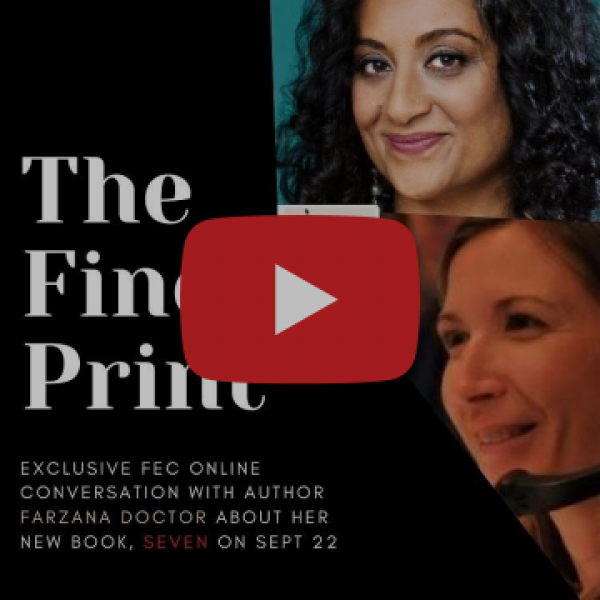
The post Has Feminist Organizing Stalled? appeared first on LiisBeth.
]]>The post Has Feminist Organizing Stalled? appeared first on LiisBeth.
]]>The post Federal Government Announces $3.6 Million Investment in Women-Led Social Enterprises in Ontario appeared first on LiisBeth.
]]>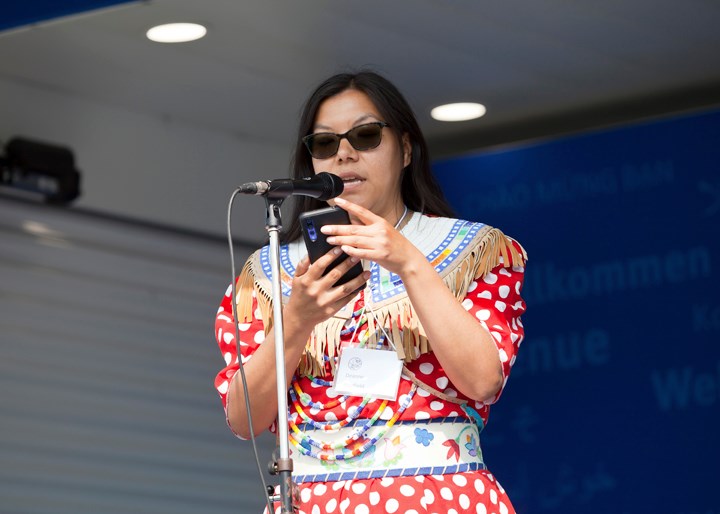
Amidst a week of news about mass shootings, UN reports about food instability due to climate change, Trump’s approval rating increase, and the firing of women of colour at Equal Voice, news about a new investment, even if small, in Ontario’s social enterprise space comes as a welcome relief.
Clearly, we need social entrepreneurs more than ever.
Earlier today, in London, Ont., the Honourable Mary Ng, Minister of Small Business and Export Promotion, announced a new $3.6 million investment in diverse women social entrepreneurs in Ontario as part of the Women Entrepreneurship Strategy (WES) initiative that seeks to double the number of women-owned businesses by 2025.
The funds will go towards the creation of the Women of Ontario Social Enterprise Network (WOSEN) and the development of a fresh, sophisticated social enterprise entrepreneurship program based on inclusive design and Indigenous approaches to venture creation. The WOSEN project aims to support 150 new women-led social enterprises, as well as expand 75 existing ones. It will also offer 10 women-centred innovation training sessions to 250 people, training for 35 business coaches, and connect $3.5 million of capital through the Women Impact Investor Network.
That’s a lot of impact for just $7 million. But the social enterprise space is used to making a dollar stretch.
The WOSEN project is led by Pillar Nonprofit Network (London, Ont.), a well-established network of more than 600 non-profits plus its all-star list of project partners that include The Centre for Social Innovation (CSI), NORDIK Institute, Okwaho Equal Source, Lean4Flourishing, Eve-Volution Inc (LiisBeth Media’s parent entity), plus The Social Enterprise Institute and the SVX. The startup consortium will be collaborating with others to develop the new program plus outsource the delivery of that program through various partners over the next three years.
Why Women?
The need for a women-centred program and investment has long been clear to the social entrepreneurship community in Ontario. Women have dominated the for-profit and non-profit social enterprise space. Tonya Surman, founder and CEO of the Centre for Social Innovation, has worked to support over 5,000 social-purpose companies since 2008. The CSI is home to nearly 1,000 organizations, 2,700 social innovators, and according to Surman, 58 percent of their members are women. “CSI has been female-led for 15 years and we know first-hand the challenges of getting the support to be able to grow our businesses,” says Surman.
One of the most significant barriers to sustainable growth for women social entrepreneurs, apart from access to aligned capital, is finding relevant programming, mentors with the right experience, and a supportive network.
Research shows that many women social entrepreneurs eagerly line up to participate in mainstream startup support programs, only to find that the programming is one-size-fits-all or tech and venture capital pipeline–oriented. Only 44 percent of 117 startup support organizations in Ontario consider gender and diversity when recruiting or selecting clients. Fewer still have diverse, women-centred or purpose-led enterprise programming.
Additionally, access to relevant programming of any kind has been uneven across the province. Rural areas are often left out. Diverse and Indigenous women have expressed concerns that existing programming privileges colonial approaches to venture design, leadership, and operations, which results in their reduced participation. As a result, both material economic growth—and social impact—have been left on the table.
What’s Unique?
The program aims to be the first of its kind to incorporate Indigenous values, practices, and wisdom into the design right from the start. The programming is also aiming for 70 percent participation by underrepresented women entrepreneurs, including those with disabilities, Indigenous women, women-identified, two-spirited women, women in rural or remote regions, and those who identify as visible minorities and newcomers.
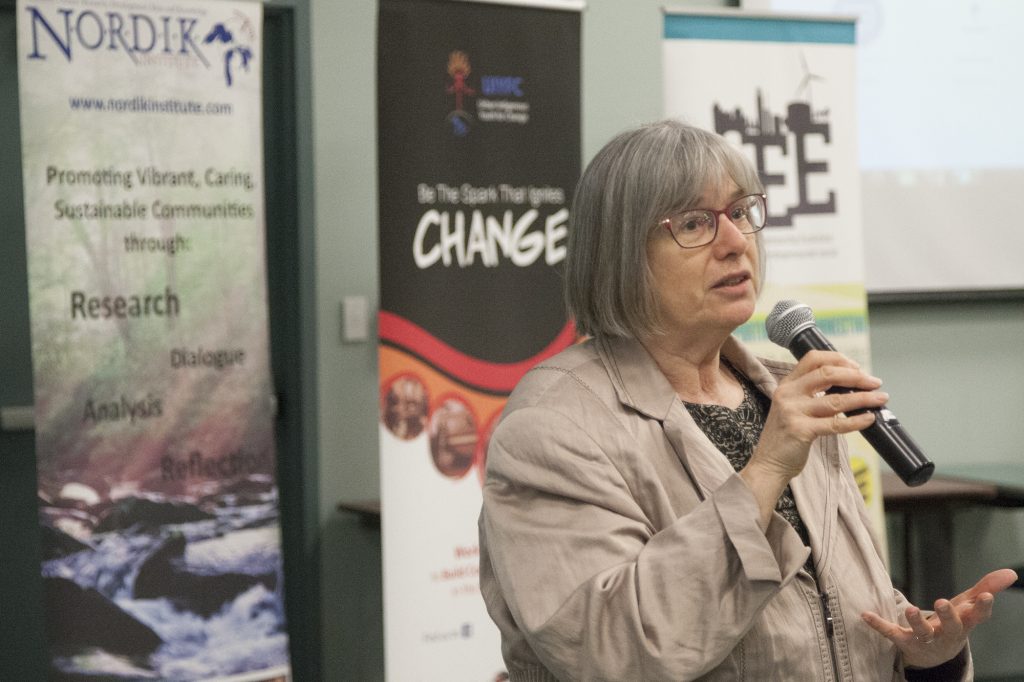
The Indigenous component of the program’s development will be led by Okwaho Equal Source, an Indigenous-owned boutique consulting enterprise created by Shyra and Rye Barberstock. Shyra Barberstock, who is the president and CEO, has long been part of efforts to support and improve access to relevant programming for Indigenous entrepreneurs. “As an Anishinaabe woman, and social entrepreneur myself, I am happy to see us finally have the opportunity to develop a program that embeds, versus tacks on, Indigenous values and concepts when it comes to venture creation,” says Barberstock. “After all, Indigenous peoples have been entrepreneurs for a long time. We know a thing or two about creating economic opportunities that help communities flourish while also sustaining the environment on Turtle Island.”
Innovating Entrepreneurship Programming
Indigenous entrepreneurship programming designed expressly for Indigenous entrepreneurs and funding for such initiatives has been on the rise across Ontario over the past five years. Initiatives like Sunshine Tenasco’s Pow Wow Pitch, Algonquin College’s Institute for Indigenous Entrepreneurship, and Toronto Councillor Kristyn Wong-Tam’s proposal for the Indigenous Centre for Innovation and Entrepreneurship all serve as prime examples.
However, no province-wide program has, as of yet, attempted to create an entirely new program from scratch that blends and builds on both Indigenous and feminine wisdom.
Andre Vashist, Director of Social Innovation at Pillar Nonprofit Network, says the approach to economic development has been missing an inclusive and Indigenous lens. “In the era of truth and reconciliation, we should be open to the knowledge, wisdom, and help by the longest living community on this land. As we are tied to land, whether we call it Canada or Turtle Island, there are many practices and teachings that can benefit our society’s economic strategy. This includes a more holistic approach that combines financial, social, and environmental considerations,” says Vashist.
Ondine Hogeboom and Ellen Martin, Co-Directors of Lean4Flourishing, points out that the exciting thing about this project is that the funding is not about delivering standard programming fare to an underrepresented group. Hogeboom adds, “We have the opportunity to work with the social enterprise community to co-create an entirely new innovative system of supports and curriculum that is grounded in current social, political, and environmental realities. This is IP [intellectual product] that, if proven effective, could be exported across Canada and beyond.”
Joanna Reynolds, Director of Social Enterprise at CSI, notes that WOSEN will enable CSI to work directly with women social entrepreneurs with a focus on helping racialized, newcomer, and Indigenous women gain equitable access to business acceleration supports. “The fact that WOSEN’s partners are all committed to learning from traditional Indigenous knowledge in order to embody the next economy, one that is regenerative, equitable, and prosperous for all, is also inspiring,” says Reynolds.
Overall, this initiative, according to Lore Wainwright, Interim Executive Director of Pillar Nonprofit Network, will help us build even stronger partnerships across the province, from rural to urban communities. “We can support a diverse population of women who want to contribute positive economic and social impact,” says Wainwright.
Creating a financially sustainable enterprise creates measurable social benefit, especially in a society that still thinks investing in social enterprises is just a new form of philanthropy versus real business. Being a woman, especially a woman experiencing intersecting oppressions, generates additional barriers.
Sure, $7 million in combined new investment over three years is not a game-changer in dollar terms when you consider investments made in other sectors. But perhaps the little innovative program that comes out of it will be.
If you like our work, consider becoming a donor subscriber today (we are 100% reader supported media): [direct-stripe value=”ds1562329655623″]
Additional WES Investments Announced This Week:
Minister Ng announces Women Entrepreneurship Strategy investments (August 8, 2019)
Also, the following women-owned-or-led businesses received up to $100,000 through the Women Entrepreneurship Fund to help them grow their business and reach new export markets:
- Shaw’s Ice Cream, located in St. Thomas, Ont., will launch new products, set up an innovation lab for product development, and create six new jobs
- Borm Capital, located in Aylmer, Que., in collaboration with ETBO Tool & Die, also located in Aylmer, will acquire a power generator, improve production processes, expand exports to the European Union, and create 10 new jobs
- Stiris Research, located in London, Ont., will commercialize an artificial intelligence–based Grammar Error Corrector, expand their clinical trial management software, accelerate sales to the United States, and create six new jobs
- A Couple of Squares, located in London, Ont., will purchase equipment to automate the production process and expand to e-commerce platforms
- Scribendi, located in Chatham, Ont., will incorporate artificial intelligence into its platform, expand exports to the European Union, United States, and United Kingdom, and create two new jobs
- DOZR, located in Kitchener, Ont., will use artificial intelligence to build an equipment management portal, and create five new jobs
- Reko International Group, located in Windsor, Ont., will create a new robotic automation system that will help the company increase its market globally
Related Articles on LiisBeth
https://www.liisbeth.com/2015/10/04/social-enterprise-in-ontario-substance-or-style/
https://www.liisbeth.com/2018/10/19/minister-mary-ng-to-announce-a-new-20m-women-entrepreneurs-fund-today/
The post Federal Government Announces $3.6 Million Investment in Women-Led Social Enterprises in Ontario appeared first on LiisBeth.
]]>The post LIISBETH DISPATCH #41 appeared first on LiisBeth.
]]>
The collage above is by Anne-Marie Hood. Artist Statement: What is growth? What is change? And how often do we misinterpret resonance with our own beliefs for growth? Perhaps it is time for a truly new approach where new ears take in sounds made up of the unfamiliar, singing unknown songs in unknown worlds.
VIEWPOINT
A Reflection on Canada’s 2018 Gender Budget
Since the release of the Canadian federal government’s 2018 gender budget at the end of February, there have been dozens of follow-on announcements about initiatives designed to advance women entrepreneurs and women-led enterprises from all sorts of organizations across the country.
On March 6, the Ontario provincial government added its voice and announced that it will also be investing in improving support for women entrepreneurs by launching a new set of initiatives that will “help young women develop an entrepreneurial mindset” through the creation of the Ontario Women’s Entrepreneurship Association.
To date, Ontario is the only province without a women’s enterprise centre or women’s entrepreneurship strategy in Canada.
Sure. Canadian women entrepreneur advocates have already expressed concern that the money designated is long overdue and “not enough”. Many more critics are rightly questioning the implementation strategies. There is legitimate concern that unchanged parental leave pay and child care policies mean continued discrimination against startup founders and small business owners in an economy increasingly characterized by precarious employment gigs. In Ontario, leaders in the field are debating if launching a women’s entrepreneur association is the right approach or first step.
Me? I still remember the Stephen Harper days. So, I am reservedly pleased with the initiatives our various levels of governments are pledging to undertake this year to advance gender justice.
I also appreciate that in both provincial and federal budgets, women entrepreneurs are at least starting to be recognized as a distinct, large, economically vital demographic whose prioritized equality and equity needs are markedly different from those of our corporate sisters.
On this, and to activist women entrepreneurs everywhere working to be heard, I say congratulations. It’s high time that your street-level, in-the-trenches voices finally pierced the routinely media-privileged corporate coterie that tends to dominate the women’s economic advancement public policy conversation.
So when it comes to Budget 2018, I have to agree with Astrid Pregel, a woman with an impressive 20 years of experience advising governments around the world on women’s advancement who wisely quipped the other night, “Sometimes, you gotta know when to clap.”
THIS WEEK ON LIISBETH
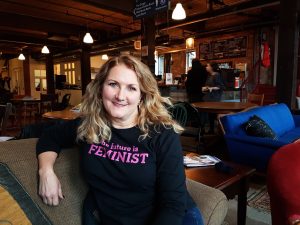
CV Harquail Reviews Lauren McKeon’s book, F-Bomb: Dispatches from the War on Feminism
We just finished a week full of activities related to International Women’s Day worldwide.
Feeling alright? Things heading in the right direction?
Maybe. But not so fast. Welcome to the anti-feminist movement in Canada, as illuminated by Lauren McKeon, an award-winning Canadian feminist author and the current digital editor at The Walrus, in her fall 2017 book, F-Bomb: Dispatches from the War on Feminism.
We felt this was an important book. So we commissioned LiisBethian CV Harquail to conduct a book review from an American feminist entrepreneur’s perspective. Harquail concurs with McKeon that “the anti-feminist movement remains strong and [therefore] feminists must find ways to be stronger.” Harquail suggests that this starts with trying to understand their limited world views and better yet, how other systems of oppression are shaping anti-feminist movements.
Read her review here.

The Artivist Woman’s Playlist by Aerin Fogel
What’s the best way to honour International Women’s Day and the art + activist women in our society who use pens, instruments, their bodies, and their voice to advance justice—often at great personal expense?
Answer: Take the time to listen to LiisBeth’s Stand Up, Get Up playlist, curated by Aerin Fogel and featuring 10 women whose songs and performances help up see the world differently.
MK Asante, who is an American bestselling author, award-winning filmmaker, recording artist, and distinguished professor, wrote: “The artivist knows that to make an observation is to have an obligation.”
Fogel is a regular playlist contributor for LiisBeth, and founder of Toronto’s fall feminist music festival, Venus Fest. Listen here.
LIISBETH FIELD NOTES

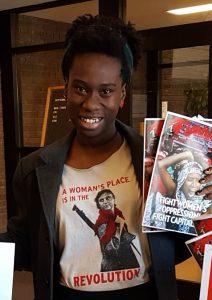
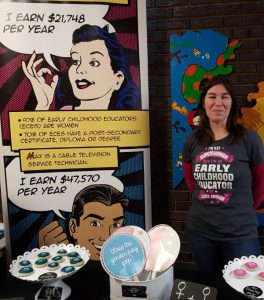
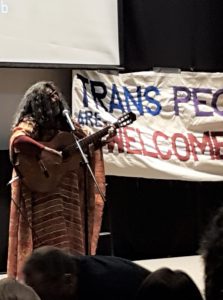
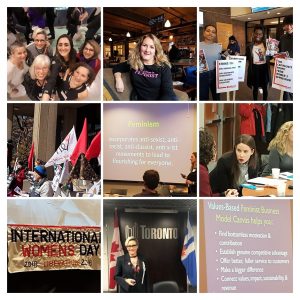
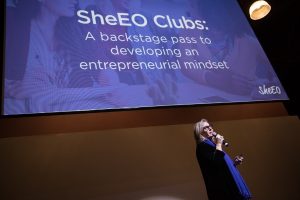
SheEO Entrepreneurship Clubs for Girls is coming to Ontario High Schools!
When SheEO founder Vicki Saunders began her quest in 2015 to create a billion-dollar loan fund for women founders, there were naysayers galore. But no more.
SheEO has found its stride. And then some: Starting this fall, SheEO will be launching entrepreneurship clubs for up to 1500 girls in Ontario high schools.
Just three years in, the fast-growing organization now has 3000 activators globally and 17 Canadian ventures (32 worldwide) under its belt, including seven new SheEOs for 2018, announced at the annual SheEO Summit & Cocktail this week:
- Margaret Magdesian (ANANDA Devices)
- Erin Millar (Discourse Media)
- Valerie Song (AVA Technologies)
- Sheena Russell (Made with Local)
- Suzanne Tyson (HigherEdPoints.com)
- Emily Bland (Project SucSeed)
- Brianne Miller (Nada)
Applications for the 2019 investment round will open August 2018. You can sign up to be notified when the application portal opens here!
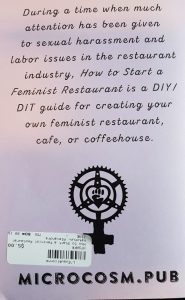
On Tuesday, March 13, LiisBeth had an opportunity to visit the new feminist bookstore in Montreal called L’Euguélionne. What a treasure trove! The store was well-stocked with feminist, LGBTQ+ and queer books, zines, pamphlets, and more (including this one featured above) in both English and French. The staff were super helpful and knowledgeable. We Say. Just. Go. And if you are interested in what makes an enterprise feminist, check out this zine!

Alexandra Ketchum, author of the zine How to Start a Feminist Restaurant, says, “Feminist restaurants are spaces that take their food and labour politics seriously. They challenge the status quo…and provide a space for political organizing, recreational activity, and commerce.” Ketchum also holds workshops on the topic. To connect with her, visit her Facebook page. To learn more about feminist bookstores, read our feature story here.
IN CASE YOU MISSED IT!
- Have you heard of the term “stretch collaboration”? While conventional collaboration tends to be organized around like-minded people working together, stretch collaborations involve working with individuals or groups that can actually tighten your throat at the mere thought of their name. According to author Adam Kahane, “…stretch collaboration encourages us to use the power of discomfort to craft and experiment our way forward with multiple options or possibilities…”
- Calling LiisBethians in STEM: Is your business about A.I., Big Data, or 3D Printing? Innovative Solutions Canada is a new program with over $100 million dedicated to supporting the scale-up and growth of Canada’s STEM-based innovators and entrepreneurs by having the federal government act as a first customer. The program is designed to encourage government procurement from companies led by under-represented groups, such as women, Indigenous, youth, disabled individuals, LGBTQ+ and others. You can find more information here.
- Calling LiisBethians under 25! You might want to apply to the Youth Can Do It! initiative where 25 diverse young entrepreneurs will be selected to come to Ottawa in June to connect with inspiring business experts who will support their journey forward. Can’t hurt, right?
CAN’T MISS EVENTS
Understanding Your Taxes: Knowledge is Power, For Women Entrepreneurs
Wednesday, March 28, 2018
2:00 PM–3:00 PM
2111 Dundas Street West, Toronto, ON
Cost: FREE. Register here.
How to Create Multiple Sources of Income
Thursday, March 29, 2018
6:00 PM–9:30 PM
Baka Gallery Cafe
2256 Bloor Street West, Toronto, ON
Cost: $25. Register here.
CryptoChicks Hackathon and Conference
Friday, April 6 to Sunday, April 8, 2018
MaRS Discovery District
101 College St., Toronto
Cost: $50–$500. Register here.
Details: “This is an open invitation to take part in a bold blockchain event. Women are underrepresented in the crypto space and with your help, we want to change that.”
Walking Your Why: Discovering Your Values Perspective
Thursday, April 12, 2018
6:00 PM–8:00 PM
School for Social Entrepreneurs
CSI Annex
720 Bathurst St., Toronto, ON
Cost: $50. Register here.
That’s it for our mid-March International Women’s Day roundup newsletter!
Like what we do? Support us! It’s easy! Subscriptions are $3/month, $7/month or $10/month. We accept PayPal and credit cards. And we also now have a Patreon page!
Funds go directly towards paying writers, editors, proofreaders, photo permission fees, and illustrators. Remember, there is no other feminist business media voice dedicated to supporting those looking to build and grow ventures in alignment with their feminist values.
The next newsletter is scheduled for the end of March 2018. In the meantime, enjoy the better weather!

Petra Kassun-Mutch
Founding Publisher, LiisBeth
The post LIISBETH DISPATCH #41 appeared first on LiisBeth.
]]>The post LIISBETH DISPATCH #39 appeared first on LiisBeth.
]]>
VIEWPOINT
This year I ended up celebrating the winter solstice at Kensington Market in Toronto for the first time with new friends. Paul, the initiator, described it to me as a sort of “mini-burning man”. It was an apt description. After a brief parade of giant puppets, pagan costumes and a few hundred urban revellers of all ages carrying homemade lanterns, the colourful, lit collective gathered with others in Alexandra Park, where a 20-foot high purpose-built sculpture was thereafter set on fire. The red embers floated up towards the sky while white snowflakes fell. There was drumming, dancing, and hot drinks. The diverse crowd cheered while also stamping their feet and rubbing their mittened hands together for added warmth on this dark, minus 20 centigrade December night.
While watching the flame devour the papier-mâché and chicken wire animal god sculpture, I noticed the togetherness that the fire aroused in all of us. I was also struck by the fact that while the source of holiday light varies for different cultures and backgrounds—Christmas trees, menorahs, lanterns—there was a certain universality to how people practice the season; It almost always involves acts of generosity, goodwill, healing, and reconnection. Participating in the season in this way leaves you with a sense that renewal is not only possible-but on its way.
It was a welcome feeling that night. And it still persists on this New Year’s Eve day.
THIS WEEK ON LIISBETH

Winter Solstice Playlist: Beginnings, Endings, and Bridges
LiisBeth is pleased to bring you this smoldering, contemplative and appropriately named new year playlist curated by Aerin Fogel, Toronto musician and founder of Venusfest, a Toronto-based feminist music festival.
The collection features some well-known artists like Bjork, as well as emerging artists like Lido Pimienta (below), a Columbian-Canadian musician and human rights advocate who won this year’s Polaris Music Prize for her album, La Papessa.

The Polaris Prize is based on artistic merit without regard to sales history or label affiliation. Winners are selected by “a Grand Jury of 11 music media professionals drawn from the greater Polaris jury pool of almost 200 writers, editors, broadcasters, DJs and personalities from across the country.
You can listen to the playlist by clicking here.

It’s here! The LiisBeth 2018 Feminist Entrepreneur Reading List!
After the entrepreneurial feminist forum in November, many attendees asked for a list of recommended readings to help them dig deeper into the concepts and topics introduced at the November 11 forum held in Toronto at the Ontario College of Art University. We thought “Good idea!” So here is the list which includes 20 books and five readings.
You can download it here. Oh, and I think it goes without saying, don’t try to read them all at once! S–p–a–c–e it out.
We hope it will give your feminist business practice what you need soar in 2018.
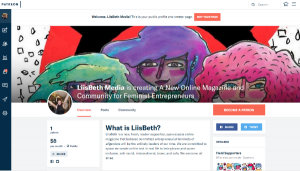
LiisBeth is Now on Patreon!
You may not realize this, but LiisBeth runs on passion diesel and volunteer time, plus the paid contributions of over 20 freelance contributors, editors, and visual artists.
Grants are hard to come by given what we do. (Feminist business practice is for some, still too niche or too scary to contemplate!). We are working on recruiting angel investors who are passionate about the cause. No luck yet. But we’re not giving up!
In the meantime, it’s really up to us, entrepreneurial feminists, to keep this conversation going and growing.
This is our humble ask: If you have read, benefited from, shared, attended one of our events, heard us speak at a conference, or talked about LiisBeth’s work at least once, we would love to see you deepen your engagement with us by supporting this work not only with your attention and praise but with donations as well.
We have lots of options. Our subscriptions range from $3 to $10 per month. Or, you can make a one time $5 or $100 donation. It’s up to you to determine what level of support works for your budget.
LiisBeth is open access regardless of how much you donate—and will remain so.
If cash is not an option, you can support us in other ways:
- Share this newsletter with five friends and encourage them to sign up for our newsletter themselves.
- Like our Facebook page. Follow us on Twitter.
- We are also interested in any in-kind hours of support in areas like social media production, volunteering at events, donated photos or artwork for articles, copyediting, and proofreading.
- We are also very interested in speaking to audiences to help more people engage with feminism at work and entrepreneurial feminism. If you need a savvy, energetic feminist entrepreneur speaker or panelist, drop us a line. We know many of them and are happy to recommend!
- If you would like us to help promote your next event, let us know! We charge $50.00-$100.00 per website listing plus social media support.
To donate now, please click here or visit our Patreon site here. We are sincerely grateful for any and all types of support.
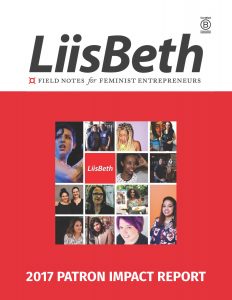
Are We Making A Difference? Is Our Work Helping to Advance Gender Equity and Equality?
We have published over 129 articles and have hosted over 500 people at our various events, salons, and forum since we began in February 2016.
But are we having an impact? Are we contributing to advancing gender justice through our work?
In December, LiisBeth decided to take stock, reflect and publish our findings.
You deserve to know if your contributions are helping us make a difference.
We need to know if we are using our resources in an optimal way given our mission.
Watch for the final report in early January.
In case you missed it!
- Five Startups Disrupting the Gender Problem in Tech by Allison Averill, published in the New Yorker. It’s a satirical piece. But woah, you could kind of see it happening for real. Scary.
- In early fall, Toronto’s Brookfield Institute for Innovation + Entrepreneurship held a design-led workshop with 25 women entrepreneurs and asked them how they would like to see $450K in provincial funding spent on supporting Ontario women entrepreneurs. They just released their report. You can find it here. And watch for the call for proposals early in 2018. here.
CAN’T MISS EVENTS
-
Jan. 20: Innovation in Craft & Design
A talk presented by Interior Designers of Canada.
3:00PM–5:00PM, C536-43 Hanna Avenue, Toronto. Free. Register here. -
April 10–11: Diversity Procurement Fair
Presented by The Canadian Aboriginal and Minority Supplier Council (CAMSC), Beanfield Centre, 105 Princes’ Blvd., Toronto
That brings us to the end of our last newsletter for 2017
Again, we hope you enjoyed it as well as our deeper reads at www.liisbeth.com.
Again, we could also really use your support. Please consider a donation, either as a lump sum ($5, $10, $100, anything will make a difference!) or monthly subscription between $3 to $10 dollars. Remember 100% of our dollars goes towards paying writers, editors, and creators a living wage rate for their work. You might even know a few of them!
The next newsletter is scheduled for mid-January.
Until then, we wish you a very happy, prosperous and generous new year.

Petra Kassun-Mutch
Founding Publisher, LiisBeth
The post LIISBETH DISPATCH #39 appeared first on LiisBeth.
]]>The post Confronting Gender Inequity And Inclusion in The Innovation Space appeared first on LiisBeth.
]]>If this is truly the case, then surely solving Canada’s innovation under-performance is a cinch. Just offer relevant support for ambitious, talented women in the innovation space and the number of entrepreneurs and businesses innovating could increase by 30 per cent overnight. The economic impact would be seismic.
Yet the $200-million-per-year innovation strategy now being touted on the conference circuit by Minister Navdeep Bains, which highlights many ways to drive more innovation output, says nothing about gender parity, let alone mentioning it as a big opportunity. Additionally, the documents circulating online about the initiative also gives no indication that it is even a priority.
Improving on Canada’s glacial innovation advancement record is an important pursuit but so far, this new plan isn’t hot enough to unleash its benefits, especially if it continues to leave female innovators chilly, and potentially out in the cold.
Are Today’s Incubators and Accelerators the Solution?
The Bains mandate states “expanding effective support for incubators [and] accelerators” as a key solution. But how well do today’s incubators and accelerators serve women?
Let’s take a look at an example up close.
One of the most prestigious, well-resourced, young talent–seeking incubators in the country, The Next 36, proudly announced on June 15 a new venture capital fund led by BDC Capital in participation with Globalive Capital and private investors. While this may sound like good news for innovation, one must ask why more money is being spent to support a program run by a 92 per cent male leadership structure?
A closer look at the organization’s leadership (as advertised on its website) finds that men make up six out of seven of its founders, 13 of its 14 board members, 13 of its 14 faculty members, and 19 of its 22 mentors. And the number of female innovators selected annually to participate in this elite program ranges from five to 11 out of a total of 36 per session over the past four years. Go a level deeper and look at seven of the companies that the current board members of The Next 36 work for as their “day job” collectively. The boards and senior management of these companies have just five women in a total of 48 positions (that’s just 11 per cent).
It doesn’t seem to get any better when it comes to the leadership of the principal partners involved in this newly announced fund. Government-owned BDC Capital lists eight men and just one woman on its executive team. Globalive Capital and Alignvest, both self-described “world-class” investment management firms, are made up of 100 per cent men in their partner ranks.
Gender inequality at work in this incubator is more than skin deep. Sadly, The Next 36, an idea with exceptional potential, is starting to look more like The Past 36 at a time when Prime Minister Justin Trudeau, a self-declared feminist, managed to achieve gender parity in cabinet in one fell swoop.
Moreover, The Next 36 example is not an isolated one. Here in Ontario alone, many regional innovation centres themselves acknowledge and report sub-optimal performance in the gender equality department with participation level ranging from a low of four per cent to a high of 25 per cent.
The innovation eco-system has a long way to go to meet Kathleen Wynne’s and Justin Trudeau’s standards of gender parity.
Back to Canada’s Innovation Strategy
If we truly believe gender diversity has a business case when it comes to realizing enhanced performance, then we must also believe that gender diversity matters in innovation policy.
Solutions
LiisBeth has four ideas to offer:
- First, government-funded incubators should be asked to pledge to achieve gender parity within management and mentor ranks by the end of 2017 and be given one year to get there.
- Innovation policy should encourage and support the creation of autonomous, women-led, female founder–focused incubators and innovation programs. It’s nice to think a gender-blind approach is a pinnacle of form, but if we are honest we know it typically means a male-led and male-centred approach to a masculine culture environment that—by the way—also welcomes women. The research is clear. This works for some, but not many.
- Unleash innovation at the margins by developing a complimentary demographic-based incubator strategy. Innovating something new and forgoing income to do it is scary enough, let alone trying to succeed in a space that doesn’t make you feel like you belong. Many talented innovators simply do not feel comfortable or motivated by being a part of a culturally or socially alien space, including Indigenous, trans, new Canadian, or age 50-plus entrepreneurs. It might be interesting to note that other nations seem to have figured this out. For example, Israel now has an ultra-orthodox tech incubator. If we want more business owners and entrepreneurs innovating in Canada, we cannot arrogantly insist that they all participate in an environment “we” think is best for them. A little support for demographically specific incubators would go a long way.
- Finally, we should also require all private venture capital firms seeking government-matching funds to disclose their gender equity and diversity state, and submit plans for improving them within 18 months if they are below the water line. We all know this: equal access to capital is absolutely critical if we are to truly leverage our talented female and other marginalized innovators.
Optimism?
There is room for optimism. For example, the Bains Ministry’s recently published backgrounder states: “Only by mobilizing every sector of society to do its part will all Canadians have the opportunity to participate fully in an innovation economy.”
In addition, Bains’ mandate letter from the prime minister says expressly that the Minister of Innovation, Science and Economic Development is expected to “help ensure gender parity.” As his mandate marching orders—and common sense—dictates, Bains must work to correct a no longer acceptable gender gap in the innovation space.
How much he has taken to heart in this arena is unclear. Bains’ recent eight-minute speech at Canada 2020 covered the usual: the importance of tech; being kinder to failure; his father’s $5 self-made entrepreneurial journey; the value of universities; and how to become a global innovation leader. But there was nothing said on the issue of gender parity in the innovation space.
If Minister Bains wants to succeed where others have failed, and if indeed, winning at innovation is a numbers game, then fostering gender equality and broader inclusion overall are two significant opportunities that should not be overlooked.
Want to write to Minister Navdeep Bains to voice your opinion on his innovation strategy? He is looking for input. Details on how to contribute to the discussion have not yet been announced, but in the meantime, you can email him at [email protected]
The post Confronting Gender Inequity And Inclusion in The Innovation Space appeared first on LiisBeth.
]]>The post 8 Financing Resources for Women* Entrepreneurs appeared first on LiisBeth.
]]>The post 8 Financing Resources for Women* Entrepreneurs appeared first on LiisBeth.
]]>